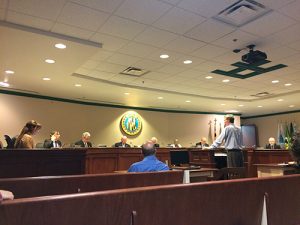
SNOW HILL – Amid few objections from farmers, the Worcester County Commissioners approved new regulations for poultry operations.
On Tuesday, in front of a crowd sporting bright yellow buttons proclaiming support for “our chicken community,” the commissioners unanimously approved a new section of the Worcester County Zoning Ordinance to address poultry operations. While several representatives of the chicken industry asked questions and offered suggestions, they shared no major objections.
“We appreciate the commissioners’ willingness to come up with a reasonable plan,” said Bill Satterfield, executive director of Delmarva Poultry Industry, Inc. “We appreciate your hard work in putting together a better ordinance that was put forth a year ago.”
In 2016, Worcester County resident Harold Scrimgeour submitted a text amendment to tighten regulations on poultry operations. He said at the time he simply wanted to see the county get something in place as CAFOs — Concentrated Animal Feeding Operations — were becoming more and more common. Though the commissioners chose not to introduce the first bill proposed, changes were made and the commissioners hosted a public hearing on the updated language Tuesday. Primary changes include definitions of poultry operations, increased setback and buffering requirements and a limit of eight chicken houses per parcel. While some members of the farming community simply sought clarification on what would be allowed under the new regulations, others suggested changes. Satterfield said he’d hoped to see a little more latitude in the timeframe in which developers are required to plant vegetative buffers. Ed Tudor, the county’s director of development review and permitting, said landscaping would be required before an occupancy permit was issued to ensure that it was done.
“We never can get caught up chasing these things down,” he said.
Farmer Virgil Shockley, a former commissioner, asked several questions and voiced concern over varying square footage measurements that could lead to someone erecting a ninth house. Tudor, however, said the language in the bill was meant to allow for various sizes of houses but could not be manipulated the way he proposed.
Pocomoke resident Sudie Gatling told the commissioners a CAFO was under construction next door to her home on Sheephouse Road.
“We’re in our 80s,” she said. “We thought we’d retire in Worcester County, never dreaming someone would put chicken houses in our backyard … How do we live? It’s going to effect the air we breathe and the water we drink.”
The commissioners told her that the new language would not have any effect on a poultry operation that had already been permitted.
“We can’t go back and change the requirements when they’re in the process,” Tudor said.
Several commissioners asked Tudor to look into the project referenced so they could consider asking the developer to keep the property’s neighbors in mind.
“It goes back to a good neighbor relation,” Commissioner Merrill Lockfaw said.
Alan Hudson, president of the Worcester County Farm Bureau, thanked the commissioners for their efforts.
“You all are looking out for agriculture in Worcester County,” he said.
Hudson said his only concern with the new regulations was the eight house limit.
“If you put a cap on something that could eventually hurt Worcester County,” he said. “That could drive some farmers away.”
Maria Payan, a consultant for the Socially Responsible Agriculture Project, asked the commissioners to consider incorporating density requirements into the new regulations. She said she was also concerned landowners could subdivide a property and then erect eight houses on each parcel. She also urged officials to look into biofilters.
“It helps eliminate pathogens,” she said.
Coastkeeper Kathy Phillips, head of Assateague Coastal Trust, said her concern was for local waterways.
“The importance of keeping these waters clean is paramount to protecting threatened natural habitat and maintaining healthy communities as well as fueling sustainable economic development in the region,” she said.
Phillips was critical of the move from family farms to the industrial CAFOs that was occurring throughout the region. She pointed to the array of CAFOs in Somerset County. She said the proposed regulations were deficient in a number of areas, including density. She also expressed concerns about the health risks associated with industrial size chicken operations.
“We have to start looking at these as something different than the traditional model of growing poultry,” she said.
The commissioners, who made no further comments on the proposed regulations after the public hearing, voted 7-0 to approve the bill.

